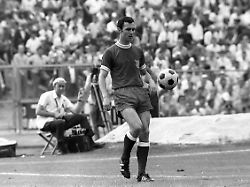It started with a cup final
How Franz Beckenbauer became the “Emperor”.
January 8, 2024, 10:23 p.m
The name “Kaiser” is firmly associated with Franz Beckenbauer. The origin story goes back to 1969 – to a cup final between Bayern and Schalke 04. However, the title of nobility did not finally become established until a little later.
The emperor”. Without a long explanation it is clear who is meant by this. Franz Beckenbauer shaped German football for decades – until his death last Sunday. He led FC Bayern to success first as a player and later as coach and president. He became world champion twice with the national team – first as a player, then as a coach.
And at some point Beckenbauer became the “Emperor”. But why exactly? There are two stories about the origin of the aristocratic title, which are not necessarily mutually exclusive. The first is discussed in detail in ARD documentary explained. There the former “Bild” man Herbert Jung has his say, who can date the first story exactly to the day.
It was the DFB Cup final on June 14, 1969. Bayern played against Schalke 04 in Frankfurt’s Waldstadion and were booed loudly by the audience. Beckenbauer was also to blame for that, goalkeeper Sepp Maier recalled on ARD. His style of play was so technically perfect that it sometimes seemed arrogant. In any case, that’s what runs like a common thread through all the anecdotes: what a special football player Beckenbauer was.
“All hell broke loose”
“Bild” man Jung remembers exactly one scene that is said to have contributed to the birth of Beckenbauer’s nickname. Schalke’s Reinhard “Stan” Libuda, then the “King of Westphalia”, dribbled towards Beckenbauer. He started to tackle, fouled Libuda and held him by his pants as he stood up. “After Beckenbauer fouled Libuda, Schalke’s flank king, things got even tougher,” Jung remembered.
However, Beckenbauer didn’t exactly defuse the scene – quite the opposite. He continued to provoke and later started juggling the ball in his own half. Actually an absurdity and a demonstration of power. The audience acknowledged this with a loud whistle concert. “All hell broke loose,” Jung recalled. That’s how it is in the monarchy, he explained in the ARD documentary: If Libuda was the king of Schalke, then Beckenbauer must be the emperor of Bavaria. So be one step above him.
And so the nickname is given. Bayern won the final 2-1, with two goals from Gerd Müller. The documentary accompanies Jung’s story with an excerpt from a “Bild” newspaper from back then. The match report was entitled: “Kaiser Franz was angry: I was a gentleman”. And the former “Bild” reporter explained: “The name has stayed with him – to this day.”
However, there is another story that Beckenbauer is said to have told himself. That it took another two years until the name “Kaiser” finally solidified. In August 1971, Beckenbauer was photographed by the Austrian photographer Herbert Sündhofer.
After the 4-0 win in a friendly against Austria Vienna, the Bayern players looked that’s what the FAZ reported, nor the Vienna Hofburg. And Sündhofer photographed Beckenbauer next to the bust of Emperor Franz Joseph I – Emperor next to Emperor. The specialist magazine “Kicker” had the headline “Two emperors met in the Hofburg”. By then, at the latest, Beckenbauer was no longer able to get rid of his aristocratic title.
